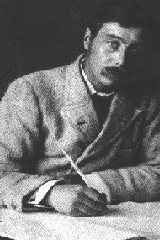 (H. G. Wells, em 1895)
(H. G. Wells, em 1895)
Herbert George Wells was born in England, in 1866, in a poor family. In 1895 he wrote "The Time Machine", which established the tone of futuristic fiction still present today. His following scientific romances treated scientists and their findings with a great deal of suspicion. According to Wells, scientists are either immoral (like the vivisectionist Dr. Moreau, "The Island of Dr. Moreau") or lunatics (like those who invented the food of the gods, "The Food of the Gods"). The future is dreadful. "the mass is always the mass, with no guard against the demagogue and the organizer" (in "When the Sleeper Awakes", written in 1899). In order to remedy this fate, Wells moved from fiction to social reform. He wrote "A Modern Utopia", in 1904 and, afterwards published several didactic works, with the sole objective of educating the people and defeating the barbarism that would take over if the world was left in the hands of the bourgeoisie. He did not succeed. The people were prepared to accept his fiction, but not his omens. In 1946, year of his death, he was considered a man with old-fashioned ideas and unable to see the present, the calamities of war, pollution, and dictatorships. His fiction had become true and he was the only one unprepared for it.
 Back to this week index
Back to this week index
 Back to main menu (trilingual)
Back to main menu (trilingual)